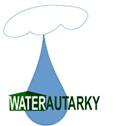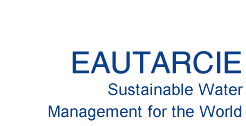
The issues and views developed herein differ on a certain number of points with conventional water supply views. They must be read discriminately, with critical thinking. On the other hand, the reader is invited to apply the same discernment with information put forth by conventional water supply proponents and water distribution company representatives. It is wise to remember that a company representative is obligated to defend his or her employer's or sponsor's interests. He or she is not permitted to undermine the company's interests, be they products or policies.
The considerations explained on this website's pages concerning the legal aspects of water utilization must be regarded as a citizen's manifesto on water policies. The decision to adopt a PLUVALOR system is a personal choice that should strictly come under private concerns.
The text within this page was first published on www.eautarcie.com: in 2003
The original text has been adapted and translated in English by André Leguerrier and was first published on this page at www.eautarcie.org: 2009-09-24
Last update: 2017-04-23


Household Water for Non-food Uses
Innocuous Water for Non-food Purposes
In daily life, we absorb water and food that contain more bacteria, said pathogenic, than what is contained in « innocuous water ». That will be the case, for example, of the last rinse water on a lettuce head in the grocery. To demand legally compliant water for all domestic uses is scientifically incoherent. However, this does not mean that one should drink all water, no matter which. Between the unconditional hygienic approach to eliminating all bacterial life around us and a total lack of cleanliness, there is a just middle ground: adapting water quality to its end-use.
The sixth principle of sustainable water management is to adapt water quality to its end-use. It is unreasonable to use potable water for all purposes. In reality, for human consumption, only 3 to 5 litres of high quality water is needed per day, per person. For other uses, including personal hygiene, a lesser quality water is suitable. In the PLUVALOR system, this is what we call « innocuous water », but it is not potable water in the legal sense.
We must insist on the fact that « innocuous water » is not a legal concept. It is a proposal that should be debated at scientific levels, and most especially at political levels. Presently (2015), some persons are miraculously « discovering » this notion, claiming that « sanitary water at the faucet » is one of water management's new paradigms as described in our Principles of ecological sanitation page. I had already proposed this concept when I launched EAUTARCIE in the early 1990's under the name « inoffensive-quality water », from the French « eau de qualité inoffensive » (better translated as « innocuous water »). On my proposal, I met with outright hostility from water management technicians, but also from a good part of the public. At the outset, when I lectured on the possibility of distributing innocuous water at household faucets while encouraging potable water production by means of domestic filtration, I was perceived as a dangerous lunatic.
When starting from cistern water, the physical and chemical qualities of « innocuous water » will be faultless, but for the presence of a few hundred benign bacteria and sometimes of a few dozen fecal contaminated bacteria (coliform bacteria, streptococci) per 100 ml. Based on the daily practice of thousands of households over the years, accidental absorption of such water is not harmful to one's health. A normal person's immune system perfectly controls such bacterial intake. Even admitting a health risk (which is yet to be scientifically demonstrated), the risk is very weak since such water is not to be used for food or drink. Just in Belgium, hundreds of thousands of infants are bathed in such water and yet do not seem to be in lesser health than others.
Generally speaking, we propose that innocuous domestic water be qualified similarly to that water found in natural settings for swimming. For example, one could fix the limits at a level considered admissible for freshwater beaches.
In addition, rainwater's natural mildness provides unequalled comfort when compared to city water. In fact, those who have never taken a rainwater bath or shower have yet to discover the pleasure of this experience, in water that is mild to the skin, without the scent of chlorine. Moreover, the mildness of innocuous water helps reduce dishwashing and laundry soaps and detergents by up to 80%. The use of water softeners then becomes unnecessary, reducing operating costs and eliminating this source of saline pollution. The absence of calcareous compounds as can be found in hard water extends the lifecycle of household appliances and faucets. Using rainwater for non-food purposes extensively reduces water pollution by reducing the quantity of discharged wastewater, and its environmental harmfulness.
To continue reading, go to page on Biocompatible Water.




